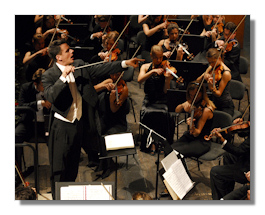
The Internet's Premier Classical Music Source
Related Links
- Latest Reviews
- More Reviews
-
By Composer
-
Collections
DVD & Blu-ray
Books
Concert Reviews
Articles/Interviews
Software
Audio
Search Amazon
Recommended Links
Site News
 Concert Review
Concert Review
Philippe Jordan and the Vienna Symphony

- Anton Webern:
- Idylle for Large Orchesta "Im Sommerwind"
- Robert Schumann:
- Piano Concerto in A minor, Op. 54
- Piotr Ilyitch Tchaikovsky:
- Symphony #6 in B minor "Pathétique", Op. 74
Rudolf Buchbinder, piano
Vienna Symphony Orchestra/Philippe Jordan
Musikverein, Vienna, Austria, 15 December 2013
Venues undoubtedly play a role in the success of a concert (and what can top the magnificent Grand Hall of the Vienna Musikverein with its fabulous acoustics?), but so do conductors. A few seasons ago I caught the Vienna Symphony Orchestra in a concert in Cologne, where the overall impression was one of deadening indifference. Now, performing in the Austrian capital at the Musikverein under their soon-to-be chief conductor Philippe Jordan, this was like a totally different ensemble, boasting plenty of character and great potential indeed.
Swiss conductor Philippe Jordan (son of conductor Armin Jordan) is only pushing 40 yet can already look back on a notable international career and will soon combine the coveted posts of Music Director of the Paris National Opera (which he holds since 2009) and, starting from the 2014/15 season, of chief conductor of the Vienna Symphonic Orchestra. His rather enthusiastic conducting style on the rostrum shouldn't distract from the fact that he clearly knows how to obtain what he wants from his musicians.
The opening Idylle for Large Orchestra Im Sommerwind (In the Summer Wind), a rarely performed early piece by Anton Webern (1904, although only posthumously premiered in 1962 by Eugene Ormandy), clearly pointed in that direction. Standing halfway between late Romanticism (Richard Strauss is never far away) and Expressionism, the richly orchestrated Im Sommerwind successfully links program music with the coherent structure of absolute music. It needs foremost clarity and precision, and Jordan exactly got that. The sonorous strings, antiphonally placed (with the first violins opposite the altos), formed the flexible base for some ravishing solos of Konzertmeister Jan Pospichal, while the excellent woodwinds (especially flute and cor anglais) effortlessly covered all moods and temperatures of this compelling work.
It was great to see the Austrian pianist Rudolf Buchbinder in this venue, where he debuted some 50 years ago, then a mere teenager. Robert Schumann may not have featured as constantly in his repertory as Haydn, Mozart or Beethoven did, yet his reading of the Piano Concerto was no less masterful. He left me somewhat doubtful at the beginning of the Allegro affetuoso because of a very restrained opening tempo and the rather predictable rubato, but in the long run this turned out to be an insightful, well-dosed performance that knew to preserve a sense of spontaneity and vivacity. Buchbinder's structural grasp was moreover undeniable, just as this sensible balance of lyricism and lightheartedness he found in the work. In this respect he and Philippe Jordan were perfect partners. The cadenza served to demonstrate Buchbinder's strength and imagination, but also reconfirmed his musicality and taste by his clear articulation and judicious pedaling.
Schumann's transparent orchestration was most convincingly rendered in the Intermezzo, lovingly shaped with plenty of detail by Jordan. The dialogues between Buchbinder and the orchestral groups took place in a chamber music-like intimacy, conveying a genuine feel of joy. The warm, singing Vienna Symphony cellos didn't fail to take their moment in the middle section. The last movement was a sunny, smiling evocation, again in a perfectly balanced collaboration between soloist and orchestra.
Even if Jordan's traversal of the Tchaikovsky Sixth completing the concert wasn't a major revelation, it nonetheless held manifold qualities that could form a base, time permitting, for a much more profound rendition. He obviously loves this music and, conducting from memory, his focus on details was remarkable, yet the symphony's massive emotional range still sounded underplayed because of the objective phrasing and inchoate dynamic and expressive nuances. Jordan's development of the opposing themes and sonic masses (and silences) in the first movement, for example, was alert and rigorous but held little surprises and even less real thrills. One might argue that he never fell into the trap of sonic excesses or easy pathos, but there is more to the "Pathétique" than a basically intellectual approach.
Here too, however, the orchestra proved highly responsive and the balance was impeccable throughout. The Viennese strings guaranteed that Tchaikovsky's polyphonic writing was rendered with clarity. The woodwinds were luminous even if less vibrantly colored than in the best Russian formations. The brass were precise and strong without being overwhelming, the timpani powerful when required. The Allegro con grazia wasn't merely elegant but Jordan's ear for intricate detail (as in that terrifying blend of pounding timpani and horns underpinning the strings) kept the suspense running. The third movement, on the other hand, sounded too comfortable (in spite of the excellent brass near the end); more an efficient orchestral demonstration than an inexorable run towards the abyss. The Adagio lamentoso was deftly handled, featuring superb lower strings and bassoons – though the final dying moments were nearly ruined by a violinist who accidentally bumped his instrument.
Maestro Jordan has made a successful bond with the Paris Opera – the French press dubbed them a "winning team"; hopefully he will do the same with the Vienna Symphony.
Copyright © 2013, Marc Haegeman












